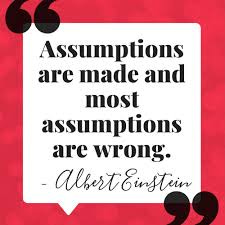Assumptions
Are Usually Wrong #114

I presumed that Dan and I would grow old together and die. We were healthy, worked hard, and saved our money, but we never planned for life if one of us died before the other.
I would have been better prepared today had I not made that assumption. We had a long, wonderful life together, but I was ill-prepared for caregiving and widowhood when it knocked at my door.
That experience led me to consider aging well and assumptions in general - assumptions being things people accept as accurate or as sure to happen without proof.
We assume when we think we know:
People's motives.
What people’s skills, abilities, and competencies are - even though they are based on gender, race, and age.
Information people have and how they understand it.
The truth is that every person ages differently. Yet, we often talk about older adults as if they are the same: sick, unable to learn new things, and resistant to change. These presumptions influence our attitudes and limit our beliefs about what they can do.
In the article Myths, Fake News, and Misinformation, I discussed beliefs about older adults. If I believe they are authentic without examining them critically, I will most likely be wrong - just as I did by assuming Dan and I would live together forever and as Albert Einstein said many years ago:
The National Institute on Aging lists 10 Myths about Aging. That list includes
Depression and loneliness are normal.
The older people are, the less sleep they need.
Older adults can’t learn new things.
Older adults will inevitably get dementia.
Older adults should take it easy and avoid exercise - so they don’t get hurt.
Older people will have to give up driving.
Older people can’t quit smoking.
I’m not here to refute those statements. I’ve proven to myself they are not valid.
Suppose I believed they were, though? In that case, what would my life be like? Would I tell myself I’m too old to write this newsletter or learn Spanish? Would I watch television and play video games all day because I believed I was too old to drive or exercise? Would I take numerous medications because the experts say I’m going to be depressed?
The HelpAge website says
Evidence has shown that negative beliefs can adversely affect an older person's health. Older adults with negative attitudes about aging could live 7.5 years less than those with a positive attitude. Conversely, older people with a positive view of aging tend to participate in physical activity more frequently.
So as part of my effort to age well, I want to focus on a positive outlook, and one way to do that is to challenge my assumptions and to think critically - to look at things clearly and judge them fairly - so says this video.
Do you need to review your assumptions and toss some of them? Are you aware of what they are? I sure wasn’t.
This LinkedIn website provided ideas I want to adopt as I control my assumptions better.
Ask rather than presume. Instead of basing my decisions on what I think I know, I need to check them out and ask questions for clarification.
Respond rather than react. Comments can easily trigger you, especially when your defenses are in play. I read an article from the Think Twice, It’s Alright newsletter which gave me excellent directions for managing triggers.
So, next time you are triggered, consider my invitation.
Try not to react immediately. And take a few minutes to go through these steps:
Acknowledge that you are triggered.
Feel in your body where the discomfort is.
Stay with it for the time of 10 breaths.
Listen to what comes up.
You might quickly realize the reason for your behavior. The discomfort might dissipate as you take one further step toward responsiveness.
Find positive intentions. Very rarely are people out to get you. They may have goals different than yours, but they usually have good intentions.
Shift from expectations or assumptions to shared understanding. Many conflicts occur when your expectations differ from those of others. It’s helpful to convert a bunch of expectations into a shared account of the facts.
This approach makes sense to me.
Articles I want to share this week are:
The Contradictory Pursuit of Complete Contentment - I love the prompts for further consideration.
What Gets You Out of Bed in the Morning - Every one needs a reason.



Great advice and insights, as always. We must keep learning!
A fine article, Janice! I followed a couple of your links, too. I appreciated this list of what gets us out of bed in the morning : Find what you love. Find what you are good at. Find what you can get paid for. Find what the world needs. I have found the first two! So, yay! I don't care about the third one ( not because I am rich - far from it. I just don't mind being poor.) Does the world need what I have? Not really, but 250 people find it entertaining. So that's a start. Thank you Janice for your always thought-provoking work and for putting more good out into the world.